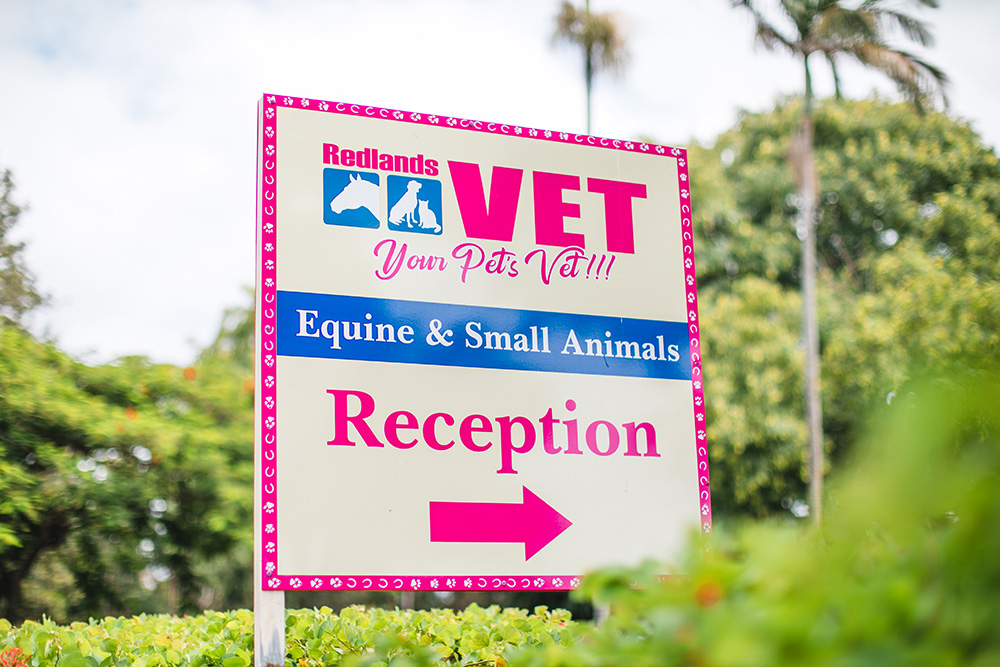
Frequently Asked Questions
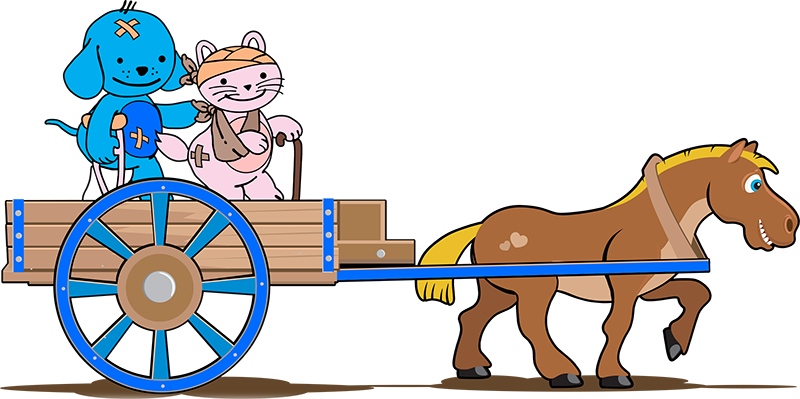
What vaccinations does my new puppy/kitten need?
Vaccinations for your kitten and puppy are extremely important, as the diseases against which they protect can be fatal if contracted.
Puppies need to be vaccinated against a variety of diseases, including distemper, two strains of kennel cough, parvovirus and hepatitis. The best form of protection comes from the C5 vaccination, which protects against all of these conditions. The C5 vaccination is the minimum boarding requirement for most boarding kennels, so even if you think that your puppy is unlikely to come into contact with other dogs, it will need to be vaccinated to ever be boarded or even to attend puppy preschool. The typical vaccination schedule is a course of three injections.
1. 6-8 Weeks: C3 or C5 Vaccination
2. 10-12 Weeks: C5 Vaccination
3. 14-16 Weeks: C5 Vaccination
This course is then followed by yearly boosters, administered every 12 months after the date of the final initial vaccinations.
Kittens need to be vaccinated against feline enteritis and cat flu. The vaccination to protect against these conditions is the F3 vaccination, and the kitten should receive a course of three injections in the same sequence as that for puppies. Again, yearly boosters will then be required.
My dog is older, and I am not sure if he has been vaccinated. What should I do?
Vaccinations for older dogs is still very important, and compulsory for boarding kennels. If your dog is older, he will most likely only require a course of 2 injections, one month apart, followed by yearly booster injections.
What about Heartworm prevention?
Definitely a case of prevention being better than cure! Heartworm is spread by mosquitoes and it takes just one bit to infect an unprotected pet. Treatment is difficult and sometimes the only symptom, especially in cats, is sudden death.
For DOGS we recommend the yearly Proheart SR-12 Injection, which gives 12 months coverage. Puppies can start on this at 12 weeks of age – they receive a booster at 6 monts, and then boosters every 12 months with their annual vaccination.
For CATS we recommend a monthly spot on of ADVOCATE or REVOLUTION
What is the best age to have my animal desexed?
We recommend that dogs and cats be desexed at approximately 5-6 months of age. This allows them to develop a little maturity, but usually means that they will not develop any undesirable behaviors associated with hormones. We also desex pocket pets including guinea pigs – please contact us for more information.
Is it a big surgery to have my animal desexed?
All animals, like humans, react to the surgery differently, but generally speaking most animals recover from the operation very quickly. The surgery is generally a day surgery, and your animal can be dropped off in the morning and picked up that same afternoon. We provide an all inclusive service for your pet, which includes:
- An admission appointment
- Day stay in hospital
- Pre operative pain relief and sedative
- IV catheter placement
- Intravenous fluid therapy
- Tailored general anaesthetic
- Nail Clip
- Post operative pain relief
- 2 complimentary return appointments to check the incision, and then to remove the sutures
What are the basic things that my cat/dog needs to stay healthy?
All pets should be vaccinated and have protection against parasites such as ticks, fleas, mange, heartworm and intestinal worms. There are a variety of products readily available to assist you in the protection of your pet, so please contact us for more information. A good diet and plenty of exercise (for dogs) is also essential.

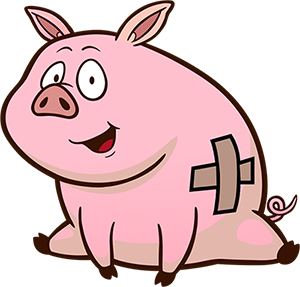
What should I do if I suspect my pet has a tick?
Paralysis ticks are very nasty parasites and are unfortunately very common in our area. If you suspect that your pet has tick paralysis, you need to seek veterinary advice immediately, as there is more chance of successful treatment if we catch it early. Signs to look for include wobbliness in the hind legs, drooling, frothing at the mouth (particularly in cats), difficulty breathing and reluctance to stand. If you do find a tick on your pet, and are comfortable removing it yourself, apply some type of insect repellant to kill it (i.e. Aeroguard, Frontline), leave it for 15 minutes, and then pull the tick out with tweezers. Prevention is always better than a cure, so ensure that you combine some form of tick control (i.e. tick collar, Frontline) with thorough daily checks of your pet.
My dog has just bitten a cane toad. What should I do?
The toxins secreted by the cane toad can be very damaging to your pet. The best thing to do is to immediately rinse the dog’s mouth out with water, particularly the gums, as this is where the toxin sticks, and seek veterinary attention.
What should I do if my dog eats Rat Sak, or some other poisonous substance?
This is very common in dogs and is also very dangerous, and can often be fatal. The chemicals in Rat Sack induces mass internal bleeding and will make your pet very sick. You need to bring your pet straight into the clinic, and we will give him/her a tablet to vomit up the substance, and will then give him supportive therapy to try and counteract the liver and intestinal damage.
My horse seems to be exhibiting signs of colic - What should I do?
Colic is not a disease in itself, but is a symptom of underlying abdominal pain. Colic can often be fatal in horses, so if you horse starts showing signs of discomfort (i.e. rolling, sweating profusely, refusal to eat, inability to pass feces, pawing the ground) you need to contact your vet immediately for advice.
My horse has just eaten a whole bag of feed. Should I be concerned?
Horses have incredibly delicate digestive systems, and as such, any abnormality in feed volume or type can be very damaging. Starch overload (and this can be in the form of horse feed, or in some cases, as we have seen, dry dog food!) to the equine hind gut produces a number of rapid and detrimental effects, including the release of toxins into the blood stream and severe abdominal pain. Secondary effects most often include laminitis, a debilitating foot condition. If you suspect that your horse has eaten a large amount of some substance, you need to seek veterinary attention immediately so that we can drench your horse with paraffin oil in an attempt to move the food out of his system.
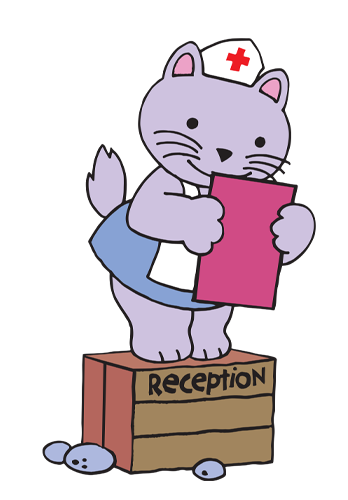
Contact Us
(07) 3207 7325
reception@
Address
433 Boundary Rd
Thornlands
QLD 4164
Opening Hours
Monday - Friday: 7am - 7pm
Saturday - Sunday: 7am - 3pm
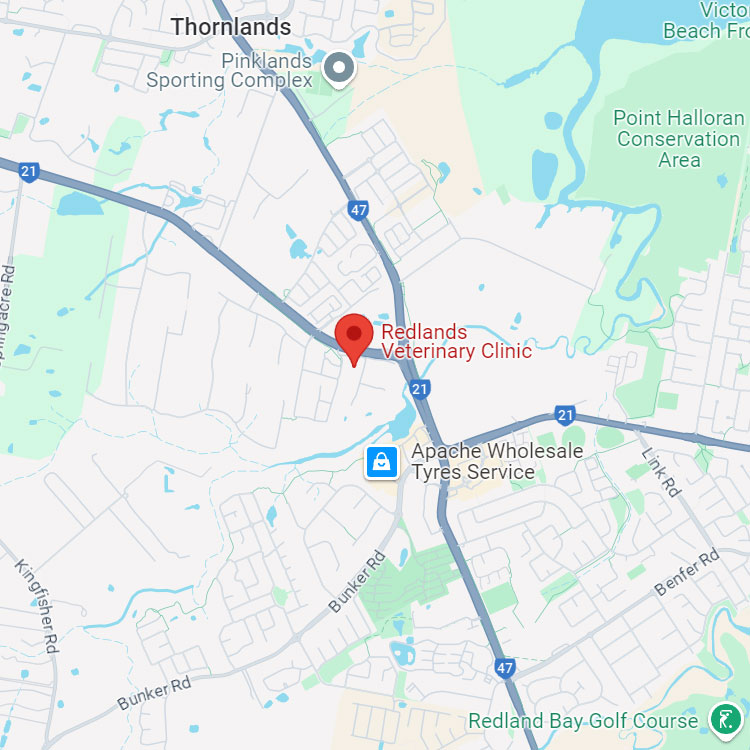
Opening Hours
Mon - Fri (7am-7pm)
Sat-Sun (7am-3pm)